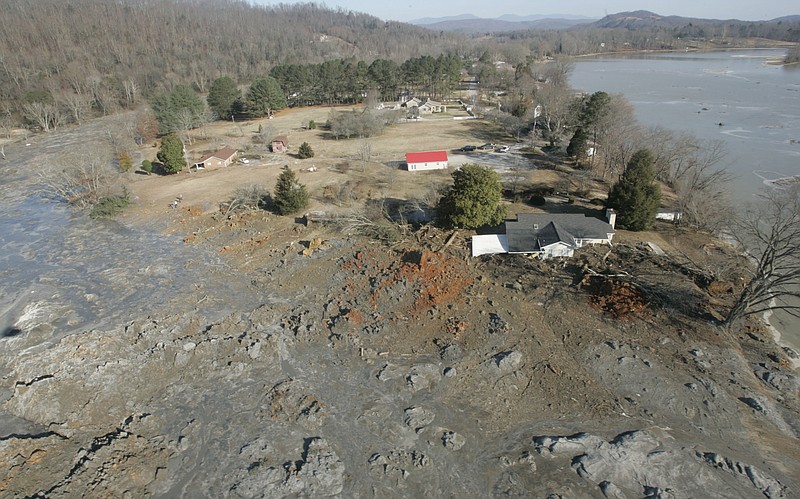The Kingston ash spill left an indelible memory on Tennesseans after a towering wall holding toxic coal ash from TVA's Kingston power plant sent a tsunami of sludge spilling onto about 400 acres of the Emory river and rural residential land in Harriman in 2008. More than 1.1 billion gallons of dangerous gray muck dislodged homes from foundations, inundated yards and boat docks and permanently spoiled pastures.
No one was seriously injured in the landslide, but more than three dozen cleanup workers died a decade later from illnesses related to the $1 billion remediation, which wasn't completed until 2015.
Now the Trump administration is moving full-steam ahead with federal deregulation of the waste from coal-fired power plants and ash pollution. And much of that federal scaling back simply transfers pollution responsibility to states that have too little expertise and manpower to deal with it. Some states are trying to protect themselves. Others, not so much.
In the same decade of cuts at EPA, fueled by the rhetoric that environmental responsibility should be shifted from the federal to the state level, 30 states - including Tennessee, Georgia and Alabama - also were busy cutting funding from their own environmental agencies, according to a new study of state budget records by the nonpartisan Environmental Integrity Project.
Read more here:
Environmental Integrity Group’s “Thin Green Line” report: https://tinyurl.com/v69hojcStateline.org’s “State’s split on coal ash” report: https://tinyurl.com/u2he9kq
We can think of this as a double whammy on environmental safety nets for us. The feds are pulling back. And the states are, too.
The budget study, titled "The Thin Green Line: Cuts to State Pollution Control Agencies Threaten Public Health," examined spending and staffing in state pollution control programs in the lower 48 states from 2008 to 2018.
Eric Schaeffer, executive director of the Environmental Integrity Project and a former director of civil enforcement at the U.S. Environmental Protection Agency, calls the Trump administration's transfer of weakened EPA authority to the states "a shell game."
State environmental agencies such as the Tennessee Department of Environment and Conservation and Georgia's Department of Natural Resources and Environmental Protection Division have long been the enforcement arms of EPA. It was TDEC, not EPA, that was the normal overseer of coal ash storage before the Kingston ash spill. And it was Tennessee that was the early responder. It later fell to EPA to engineer and require TVA's ensuing cleanup.
But since 2008, Tennessee cut more than 20% in spending on pollution control programs, adjusted for inflation - a reduction of more than $41 million, according to EIP's study. Much of that reduction was due to cutbacks in manpower: In 2008, TDEC's staff numbered 1,127. In 2018, it was down by 247 people for a total of 880 - a nearly 22% drop. The drop makes Tennessee No. 6 in the country for the largest percentage cuts to state environmental agency staff.
In that same decade, Georgia's state environmental spending also fell more than 20%, and its staffing was cut by more than 19 percent. Alabama never had even half the staff or spending of Tennessee or Georgia, but still fell in both categories.
Altogether, EIP found that 31 states reduced funding for the environmental agencies' pollution control programs over the decade, with 25 states imposing cuts of 10 percent. At the same time, 40 states reduced staffing levels, with 21 cutting their environmental workforce by at least 10 percent. Overall, states eliminated 4,400 positions at the very agencies that the Trump administration now says can better provide oversight of coal ash pollution.
In the meantime, Congress and the White House have cut the federal EPA's funding for pollution control and science by 16 percent (adjusted for inflation) while reducing the EPA workforce 16 percent with the elimination of 2,699 positions.
"The EPA's strategic plan for 2020 promises to 'restore authority to the states through cooperative federalism,' while 'sharply refocus[ing]' EPA on supporting states," according to the EIP report.
The federal government wants the public to believe that EPA can step back and states can pick up the slack. But don't be fooled. These numbers clearly demonstrate that shifting more responsibility for environmental programs from federal to state agencies will leave gaping holes in the safety net that protects public health and our natural resources from dangerous pollutants.
Are we feeling protected, yet?
Here's the thing: Governors, presidents and lawmakers know exactly how to shut down questions like this from worried citizens - they wave around the word "taxes."
Don't let them get away with this. Remember that the rich and the corporations got an enormous tax cut a couple of years ago. Also, realize that coal and fossil fuel lobbyists are behind these rollbacks and rule changes. Trump's EPA administrator, Andrew Wheeler, is himself a former coal lobbyist who has proposed softening rules that aim to limit the leaching of coal ash toxins into water supplies like the Emory, Clinch and Tennessee rivers.
Tennessee and Georgia politicians need to hear from you. They need to be reminded that the workers in our environmental programs are what the EIP report calls "the thin green line" that protects our families, forests, fields, and waterways from pollution.
If we cut that line, either through negligence or anti-government ideology, we risk being left with a contaminated landscape. Ask the more than 300 families who had to move from Harriman, Tennessee.
We've given you talking points, but you must pick up the phones and your pens.
Don't go quietly.
